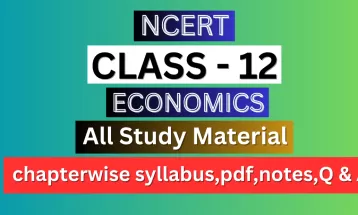Psychology Class 12 Chapter 8 | Part - 4
Chapter 8: Psychology and Life
Part 4: Promoting Pro-Environmental Behaviour, poverty and discrimination
Promoting pro-environmental behaviour
Pro environmental behavior includes both actions that are meant to protect the environment from problems and to promote a healthy environment. Some promotive actions to protect the environment from pollution are:
- Reducing air pollution by keeping vehicles in good condition or changing to non fuel driven vehicles, stopping the practice of smoking.
- Reducing noise pollution by ensuring that noise levels are low. For example, discouraging needless honking or making rules regarding noisy music at certain hours.
- Managing disposal of garbage sensibly. For example, encouraging separation of biodegradable and nonbiodegradable garbage. Management of industrial and hospital waste is important.
- Planting trees and ensuring their care, keeping in mind that those plants and tree should not be planted, that have adverse health effects
- Saying no to plastics in any form, reducing toxic waste that pollute water, air and soil.
- Reducing the non biodegradable packaging of consumer goods.
- Laws related to construction that violate optimal environmental design.
Social concern: Poverty and Discrimination
- Poverty is defined mainly in economic terms and measured in terms of income, nutrition (daily calorie intake) and amount spent on basic necessities.
- Other indicators of poverty are physical health and literacy.
- From the socio psychological point of view, the most commonly accepted definition of poverty is that it is a condition in which there is a lack of necessities of life in the context of unequal distribution of wealth in Society.
- Some authors add that the sense of deprivation and social disadvantage are additional features of poverty.
- Deprivation refers to the state in which a person feels that they have lost something valuable and are not getting something that they deserve. On the contrary, poverty refers to an actual shortage of the resources necessary for living, and thus can be somewhat objectively defined.
- Deprivation is a question of perceiving or thinking that one has got less than what one should have got. But, poverty is actually getting less and is not a necessary condition for experiencing deprivation.
- The situation of the poor worsens if they also experience deprivation.
Social disadvantage
- Poverty and deprivation are linked to social advantage. That is a condition because of which some sections of society are not allowed to enjoy the same privileges as rest of the society.It possesses an obstacle to the growth of these sections in the society.For example, in our society, caste system is the largest source of social disadvantage.
- Social disadvantage because of caste and poverty has created the problem of discrimination. In the context of poverty, discrimination refers to the behavior that makes a distinction between the rich and the poor, favoring the rich and the advantaged over the poor and the disadvantaged.
- This distinction can be seen in social interaction, education and employment.
- Social disadvantage and discrimination prevent the poor from improving their social economic conditions through their own efforts.
- Discrimination becomes A cause and a consequence of poverty.
Psychological characteristics and effects of poverty and deprivation
- Motivation- The poor have low aspirations and low achievement motivation and high need for dependence. They explained their success in terms of luck.They believe that their life is controlled by factors outside them.
- Personality- The poor and deprived have low self esteem and high anxiety and introversion.They dwell on the immediate present and do not focus on future.They prefer small, immediate rewards to larger rewards.They live with hopelessness, powerlessness and justice and loss of identity.
- Social behaviour- The poor and deprived sections exhibit an attitude of resentment towards the rest of society.
- Cognitive functioning- It has been found that intellectual functioning and performance on tasks is lower among the highly deprived. The environment in which children live either enriched or empowered makes a difference in their cognitive development, which is reflected in cognitive task performance.
- Mental health- There is an unquestionable relationship between mental disorders and poverty or deprivation.The poor are more likely to suffer from specific mental disorders compared to rich due to constant worries about basic necessities. It has been suggested that depression may be a mental disorder, largely of the poor.They suffer from emotional and adjustment problems due to hopelessness and loss of identity.
Major causes of poverty
- Poverty is sometimes caused by natural disasters like earthquakes, floods or man made disasters like poisonous gas leaks.
- One generation may be unable to eradicate poverty, and the next generation continues to remain in poverty.
- Some hold a view that the poor themselves are responsible for their poverty. The poor lack the ability and motivation to put an effort and make use of available opportunities which lead them into poverty.
- The belief system culture of poverty convinces the person that they will continue to remain poor and the belief is carried over from one generation of the poor, which leads to poverty.
- Economic, social and political factors together account for poverty. Discrimination leads to lack of opportunities which leads to political and social exploitation.
- The geographic region in which one lives is set to be a significant cause of poverty.
- The poverty cycle is another cause of poverty. Low income and lack of resources leads to low health, nutrition and skills, which leads to low employment opportunities and this continues their low income condition.
Measures of poverty alleviation
- Breaking the poverty cycle and helping the poor to attain self sufficiency. This could be done through financial relief, medical and other facilities.
- Creating a context for making the poor take responsibility instead of blame for their poverty.
- Providing educational and employment opportunities following the principles of social justice.
- Measures for improving mental health.
- Steps for empowering the poor.
- The concept of Antioch, or the rise of the last person in society Has helped the last section of poor to get out of poverty.Under this program, there is provision for health facilities, nutrition, education and training for employment.They are more active in rural areas.
- The poor are encouraged to start their own small scale businesses.
- Following the 73rd amendment of the constitution, the aim is to give more power to people for their development through decentralized planning and through people's participation.
- ActionAid is an international group dedicated to the cause of poverty and goals for making the poor more sensitive.
Chapter 8: Psychology and Life
Part 4: Promoting Pro-Environmental Behaviour, poverty and discrimination
Promoting pro-environmental behaviour
Pro environmental behavior includes both actions that are meant to protect the environment from problems and to promote a healthy environment. Some promotive actions to protect the environment from pollution are:
- Reducing air pollution by keeping vehicles in good condition or changing to non fuel driven vehicles, stopping the practice of smoking.
- Reducing noise pollution by ensuring that noise levels are low. For example, discouraging needless honking or making rules regarding noisy music at certain hours.
- Managing disposal of garbage sensibly. For example, encouraging separation of biodegradable and nonbiodegradable garbage. Management of industrial and hospital waste is important.
- Planting trees and ensuring their care, keeping in mind that those plants and tree should not be planted, that have adverse health effects
- Saying no to plastics in any form, reducing toxic waste that pollute water, air and soil.
- Reducing the non biodegradable packaging of consumer goods.
- Laws related to construction that violate optimal environmental design.
Social concern: Poverty and Discrimination
- Poverty is defined mainly in economic terms and measured in terms of income, nutrition (daily calorie intake) and amount spent on basic necessities.
- Other indicators of poverty are physical health and literacy.
- From the socio psychological point of view, the most commonly accepted definition of poverty is that it is a condition in which there is a lack of necessities of life in the context of unequal distribution of wealth in Society.
- Some authors add that the sense of deprivation and social disadvantage are additional features of poverty.
- Deprivation refers to the state in which a person feels that they have lost something valuable and are not getting something that they deserve. On the contrary, poverty refers to an actual shortage of the resources necessary for living, and thus can be somewhat objectively defined.
- Deprivation is a question of perceiving or thinking that one has got less than what one should have got. But, poverty is actually getting less and is not a necessary condition for experiencing deprivation.
- The situation of the poor worsens if they also experience deprivation.
Social disadvantage
- Poverty and deprivation are linked to social advantage. That is a condition because of which some sections of society are not allowed to enjoy the same privileges as rest of the society.It possesses an obstacle to the growth of these sections in the society.For example, in our society, caste system is the largest source of social disadvantage.
- Social disadvantage because of caste and poverty has created the problem of discrimination. In the context of poverty, discrimination refers to the behavior that makes a distinction between the rich and the poor, favoring the rich and the advantaged over the poor and the disadvantaged.
- This distinction can be seen in social interaction, education and employment.
- Social disadvantage and discrimination prevent the poor from improving their social economic conditions through their own efforts.
- Discrimination becomes A cause and a consequence of poverty.
Psychological characteristics and effects of poverty and deprivation
- Motivation- The poor have low aspirations and low achievement motivation and high need for dependence. They explained their success in terms of luck.They believe that their life is controlled by factors outside them.
- Personality- The poor and deprived have low self esteem and high anxiety and introversion.They dwell on the immediate present and do not focus on future.They prefer small, immediate rewards to larger rewards.They live with hopelessness, powerlessness and justice and loss of identity.
- Social behaviour- The poor and deprived sections exhibit an attitude of resentment towards the rest of society.
- Cognitive functioning- It has been found that intellectual functioning and performance on tasks is lower among the highly deprived. The environment in which children live either enriched or empowered makes a difference in their cognitive development, which is reflected in cognitive task performance.
- Mental health- There is an unquestionable relationship between mental disorders and poverty or deprivation.The poor are more likely to suffer from specific mental disorders compared to rich due to constant worries about basic necessities. It has been suggested that depression may be a mental disorder, largely of the poor.They suffer from emotional and adjustment problems due to hopelessness and loss of identity.
Major causes of poverty
- Poverty is sometimes caused by natural disasters like earthquakes, floods or man made disasters like poisonous gas leaks.
- One generation may be unable to eradicate poverty, and the next generation continues to remain in poverty.
- Some hold a view that the poor themselves are responsible for their poverty. The poor lack the ability and motivation to put an effort and make use of available opportunities which lead them into poverty.
- The belief system culture of poverty convinces the person that they will continue to remain poor and the belief is carried over from one generation of the poor, which leads to poverty.
- Economic, social and political factors together account for poverty. Discrimination leads to lack of opportunities which leads to political and social exploitation.
- The geographic region in which one lives is set to be a significant cause of poverty.
- The poverty cycle is another cause of poverty. Low income and lack of resources leads to low health, nutrition and skills, which leads to low employment opportunities and this continues their low income condition.
Measures of poverty alleviation
- Breaking the poverty cycle and helping the poor to attain self sufficiency. This could be done through financial relief, medical and other facilities.
- Creating a context for making the poor take responsibility instead of blame for their poverty.
- Providing educational and employment opportunities following the principles of social justice.
- Measures for improving mental health.
- Steps for empowering the poor.
- The concept of Antioch, or the rise of the last person in society Has helped the last section of poor to get out of poverty.Under this program, there is provision for health facilities, nutrition, education and training for employment.They are more active in rural areas.
- The poor are encouraged to start their own small scale businesses.
- Following the 73rd amendment of the constitution, the aim is to give more power to people for their development through decentralized planning and through people's participation.
- ActionAid is an international group dedicated to the cause of poverty and goals for making the poor more sensitive.











